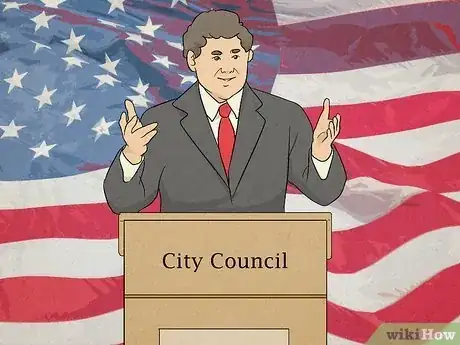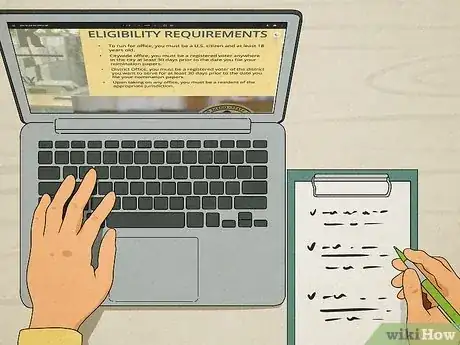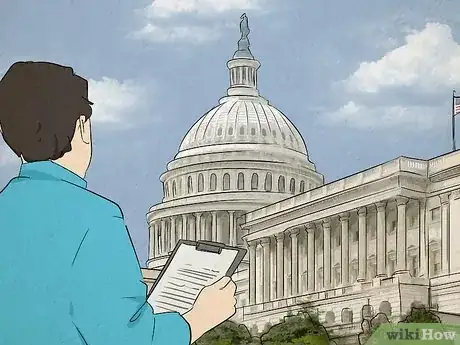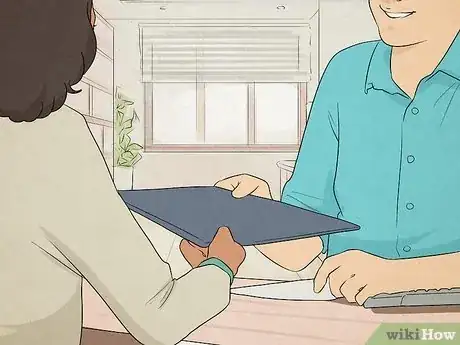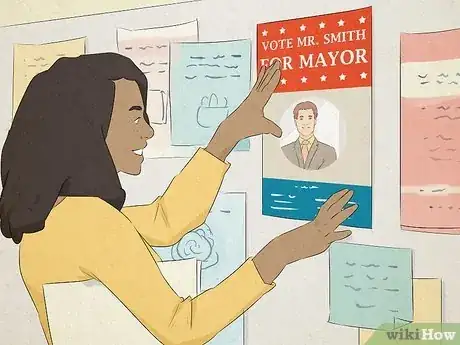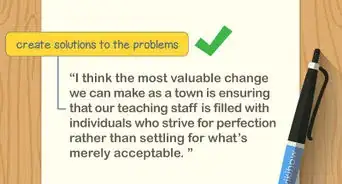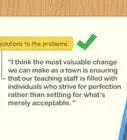This article was co-authored by wikiHow Staff. Our trained team of editors and researchers validate articles for accuracy and comprehensiveness. wikiHow's Content Management Team carefully monitors the work from our editorial staff to ensure that each article is backed by trusted research and meets our high quality standards.
There are 17 references cited in this article, which can be found at the bottom of the page.
wikiHow marks an article as reader-approved once it receives enough positive feedback. In this case, several readers have written to tell us that this article was helpful to them, earning it our reader-approved status.
This article has been viewed 700,260 times.
Learn more...
While the duties of a mayor may vary depending on which country, city, or town you live in, it is usually a critical leading role in the local government. Mayors are typically responsible for managing and speaking on behalf of a town or city. In order to become a mayor, you must be a stellar citizen, have experience working within your community, and have the leadership qualities that would inspire people to vote for you. If you establish your experience early on, properly apply, and run a successful campaign, you may be able to become the mayor of the town or city that you live in.
Steps
Getting the Experience
-
1Become involved in community initiatives. As mayor, you’ll be involved in numerous aspects of the local community. You can get a head-start in local politics and government by becoming involved in community initiatives. Local community centers, churches, hospitals, or charities are a great place to get started.[1] Introduce yourself to community leaders and become an outspoken member of your city or town.
- Volunteer opportunities could include cleaning up a local park or serving soup at a homeless shelter.
- Network with those that are working to improve the conditions of the community you're living in.
-
2Go to city meetings and events. Get acclimated to common issues and problems that your community faces. Visit local city or town hall meetings and events. Network with people who are already in government and start to develop an understanding of local politics.[2]
- Look at a calendar of meetings and events online or at city hall.
- Go to city halls and community meetings.
- Events could include festivals and fundraisers.
Advertisement -
3Build relationships with local businesses. The economy is an important aspect of any mayoral campaign. Introduce yourself to local businesses and develop relationships with them. Local companies will be interested in how you will affect their business if you're elected. Assure businesses that, once you're in office, you'll support policies that can help them.[3]
- Get an understanding of the biggest businesses in your town or city and the issues that they regularly face.
- Identify the major industries in your area by finding statistics about the local economy and identifying the industries that are thriving.
- You can also gather data by asking local business owners questions about the economy in the area.
-
4Run for a lower political office. Before you run for mayor, consider running for a lower office like city council member or county commissioner. Most mayors have held a city council position or a position in their local government before becoming mayor. Working in city council will give you experience in the day-to-day operations of local government.[4]
- Experience in local politics will give you the qualifications you need to run for mayor.
- You'll want to complete at least one term in a lower office before running for mayor.
- To learn more about running for a lower office read run for city council.
-
5Get experience by managing in the private sector instead. Any job that requires you to represent and manage a large number of people can provide the springboard you need to run for mayor. Make sure that your job requires you to make large management decisions or set company-wide policies. Before you run for mayor, you must have a proven track record in a leadership position.
- Examples of leadership positions include CEO, president, partner, or chief operations officer.
- Ex-mayor of New York City, Michael Bloomberg was in business for four decades before he decided to run for mayor.[5]
- You should have enough experience to demonstrate that you can effectively lead people.
Applying to Be Mayor
-
1Research the eligibility requirements in your town or city. There are different requirements depending on which country, city, and town you live in. Look on your local government’s election board's website and find the requirements to become mayor.[6] Common requirements include being at least 18 years old, having an address in the town or city you want to become mayor of, and being a registered voter.[7]
- Many cities and towns will also require that you’ve lived in the area for a certain amount of time.
-
2Visit your town hall, city hall, city clerk, or office of elections. It's a good idea to visit the town hall so you can ask the city clerk any questions that you have about running for mayor. If you were unable to find the required forms online, you could also pick them up at the town hall.[8]
- You can say something like, "I am interested in running for political office. Can you give me any written information on the subject or direct me to where I can get it?"
-
3Fill out the required forms. Most cities and towns will require that you fill out proper registration forms to declare your intent to run for mayor. You'll need to provide proof of residence, your name, and other personal details on the forms. These forms will typically have deadlines associated with them. Talk with the city clerk or look online for all the forms that you need to complete.
- Some forms will have a filing fee associated with them.[9]
-
4Create a committee in larger cities. Most cities and some larger towns will require that you create a committee before you can declare your candidacy for mayor. The committee will become your election campaign team. Your committee needs to be established so that the government can track your campaign’s finances to make sure that your campaign is legal. A committee will have to include, at a minimum, a treasurer and chairperson.[10]
- Select people who have experience in politics or running a campaign.
-
5Get a petition and the required signatures that you need. Pick up a petition to run for mayor from your city clerk. Most cities and towns require that you get signatures from citizens before you can be nominated as a candidate. The number of signatures that you need varies depending on how large your city is and how many residents it has. Try to get signatures from all the people you know first, then send out a canvassing team with your petition to get more signatures.[11]
- For example, to run for mayor of New York City, you need 7,500 signatures to announce your candidacy.
- You can also get signatures at community events, town halls, and fundraisers.
-
6Submit paperwork that says that you accept the nomination. Once you get enough signatures on your petition, submit it by the nomination deadline. After you submit your petition and other required documents, you may still have to send in another form to accept the nomination.[12]
Running a Campaign
-
1Hire campaign staff. You’ll need campaign staff that includes a campaign manager, treasurer, and fundraiser. The campaign manager is tasked with managing the entire campaign. This can include overall strategy and other details like scheduling public speaking events or setting up meetings with community leaders. The treasurer is responsible for handling funds while the fundraiser is responsible for raising funds.[13]
- You'll also want a communications director for larger campaigns. They will write campaign communications and will help everyone stay on message.
- You may also give each staff member their own staff that they can use to delegate tasks to.
-
2Create a campaign platform. A platform can include things like jobs, the local economy, education, and the environment. Create solutions to fix the major problems facing your town or city. Voters should be able to relate to your platform.[14]
- For instance, if your town suffers high unemployment, you can run on a platform to create more jobs.
- You can also run on a platform to raise the minimum wage and lessen the income gap.
-
3Raise money for your campaign. Campaigns need money to pay for advertising, staff, and operations. Donors could include individuals, families, businesses, or local organizations. Find people who support your campaign platform and ask them for a financial contribution.[15] Raise money by sending emails requesting donations, holding fundraisers, or asking supporters directly.
- You can ask by saying something like, "Would you be willing to make a $15,000 contribution to my campaign for mayor?"
- You can ask for more money if you're talking to a large organization, business, or wealthy community member.
-
4Advertise your candidacy. Create a website, flyers, posters, and ads for your candidacy. The more exposure you get from eligible voters in town, the more votes you're likely to get. Work with your staff to develop ways to get your message out to the public. If you have a lot of money in your budget, you can even create commercials that talk about your platform.[16]
- You can also call voters, take ads in the newspaper, advertise on social media, and make appearances on radio and TV programs.[17]
-
5Meet with local organizations, unions, and community leaders. An endorsement from a local organization or union is extremely beneficial and could get you more votes. Speak to local unions and organizations and explain how you can help them and their membership if you get elected. Build relationships with them and ask them for their endorsement.[18]
- Meet with organizations that share the same values as your campaign.
- For instance, if you advocate for raising the minimum wage, meet with organizations that also promote raising the wage.
-
6Create a canvassing team to get out the vote. A canvassing team can go door-to-door or can use email to get your platform out to people. Having more exposure and notoriety will increase your chances of getting elected. Make sure your canvassers are polite and can explain the important aspects of your campaign platform. Find where voters live and have your canvassing team talk to voters in the area.
- Canvassers should work in teams to stay safe.
- You can also do a phone drive and call potential voters to convince them to vote for you.
-
7Take public speaking opportunities. Public speaking will give you the opportunity to reach a large audience and increase the visibility to your campaign. Work with your campaign manager, communications director, or public relations director (if you have one) and schedule times to speak to the public.
- You can also go to town halls or public school meetings to speak to residents in an open forum.
- You can usually find a schedule of town hall meetings on your local government's website.
Community Q&A
-
QuestionWhat can I do now as a teen to prepare to run for mayor when I am older?
 Community AnswerLearn about civics/government and the specifics of the job. Volunteer in the community to learn more about your city and get your name/face out there. Join a political party and consider what your future platform might be. Run for student council.
Community AnswerLearn about civics/government and the specifics of the job. Volunteer in the community to learn more about your city and get your name/face out there. Join a political party and consider what your future platform might be. Run for student council. -
QuestionCan I have a criminal record while running for mayor?
 Community AnswerYes, but it will be up to you whether or not you choose to disclose that information to your voters. If you don't disclose it, it will still be found out, and it would be bad for the campaign.
Community AnswerYes, but it will be up to you whether or not you choose to disclose that information to your voters. If you don't disclose it, it will still be found out, and it would be bad for the campaign. -
QuestionDoes the mayor have to show his income, tax returns, etc?
 Community AnswerIt will depend on the size of your city. Bigger will most likely require that information, while smaller cities are less likely.
Community AnswerIt will depend on the size of your city. Bigger will most likely require that information, while smaller cities are less likely.
References
- ↑ http://kidshealth.org/en/parents/volunteer.html
- ↑ https://www.ndi.org/sites/default/files/Political_Campaign_Planning_Manual_Malaysia_0.pdf
- ↑ http://www.ushistory.org/gov/5c.asp
- ↑ https://www.runforoffice.org/elected_offices/445-mayor-of-san-francisco
- ↑ http://www.businessinsider.com/how-billionaire-michael-bloomberg-made-and-spends-his-fortune-2015-7/#rn-on-valentines-day-in-1942-bloomberg-grew-up-in-medford-massachusetts-a-small-town-near-boston-1
- ↑ https://www.findlaw.com/civic-engagement/making-sense-of-local-government/how-to-run-for-mayor.html
- ↑ http://abc7chicago.com/archive/7656949/
- ↑ https://www.a2gov.org/departments/city-clerk/Elections/Pages/Filing%20Petitions%20for%20City%20Office.aspx
- ↑ https://www.sandiego.gov/city-clerk/elections/city/run
- ↑ https://billypenn.com/2015/03/09/how-to-run-for-office-in-philadelphia-signatures-committees-and-forms-like-whoa/
- ↑ https://www.runforoffice.org/elected_offices/21331-new-york-city-mayor
- ↑ https://www.runforoffice.org/elected_offices/21331-new-york-city-mayor
- ↑ http://aristotle.com/blog/2014/09/how-to-run-a-political-campaign-2/
- ↑ http://www.crf-usa.org/election-central/political-parties-platforms.html
- ↑ https://fivethirtyeight.com/features/four-ways-to-fund-a-presidential-campaign/
- ↑ http://www.apa.org/monitor/2012/04/advertising.aspx
- ↑ http://www.fppc.ca.gov/learn/campaign-rules/campaign-advertising-requirements-restrictions.html
- ↑ http://www.scholarsstrategynetwork.org/brief/alliance-us-labor-unions-and-democratic-party
About This Article
If you want to run for mayor, start by checking the eligibility criteria in your town or city because they vary depending on where you live. Then, visit your town hall or city clerk's office to ask any questions you have and pick up the required forms. To register, fill out the forms with your personal details and collect the number of signatures from citizens you need to be nominated. Finally, prepare for the campaign by hiring a campaign team and drafting a platform to tackle your city's major problems, like jobs or the economy. For tips on how to raise money for your campaign and advertise your candidacy, keep reading!



